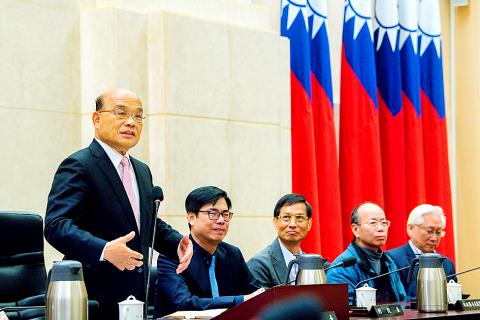Premier Su Tseng-chang (蘇貞昌) led his Cabinet in resigning en masse yesterday evening, weeks earlier than required by the Constitution, following Saturday’s elections that saw President Tsai Ing-wen (蔡英文) win re-election and the Democratic Progressive Party (DPP) retain its legislative majority.
However, Su will continue to serve as premier after the president earlier in the day asked him to remain in his post, Presidential Office spokesman Xavier Chang (張惇涵) said.
Tsai met with Su in the Presidential Office at noon, and asked him to continue to serve as head of the Executive Yuan to maintain stability, and Su agreed, Chang said.

Photo: CNA / Executive Yuan
Tsai had told a news conference on Saturday night that she expected to keep her executive team for her second term to maintain a level of stability amid rapidly changing domestic and international situations.
The 72-year-old Su became premier on Jan. 14 last year. He served as premier from Jan. 25, 2006, to May 20, 2007, and as DPP chairman from 2012 to 2014.
By law, the Cabinet has to resign before the start of the next Legislative Yuan, which will be on Feb. 1.
Lawmakers elected on Saturday will have several personnel nominations to review once they take their seats and during the course of their four-year terms.
The Act Governing the Exercise of Legislative Power (立法院職權行使法) stipulates that legislators should exercise their power of giving consent to the auditor general, prosecutor-general, grand justices, and the president, vice president and other members of the Control Yuan and Examination Yuan, adding that the appointees should be voted on during plenary sessions of the Legislative Yuan without deliberations.
The nominations would be confirmed if they win more than half of the legislative votes, the act says.
Tsai has the opportunity to make a substantive impact on the membership of those posts.
The term of the current Control Yuan members is to expire on July 31, so lawmakers must review the qualifications of Tsai’s nominees and give consent to them by that time.
Current Examination Yuan members are to step down when their terms ends on Aug. 31. The number of nominees to replace them will be reduced to seven or nine, a reduction stipulated by an amendment to the Organic Act of the Examination Yuan (考試院組織法) last year.
The terms of four of the Council of Grand Justices — Huang Horng-shya (黃虹霞), Wu Chen-huan (吳陳鐶), Tsai Ming-cheng (蔡明誠) and Lin Jiun-yi (林俊益) — are to expire on Sept. 30, 2023.
Once they are replaced, all 15 justices would have been nominated by Tsai Ing-wen. She will also be able to nominate a new prosecutor-general, whose term ends in May 2022.
Lawmakers are also to confirm the premier’s nominees for members of the National Communications Commission, Central Election Commission and Fair Trade Commission.
As the terms of these commissioners would overlap to ensure the continuity of governance, lawmakers would confirm the nominees twice during their four-year terms.

DAREDEVIL: Honnold said it had always been a dream of his to climb Taipei 101, while a Netflix producer said the skyscraper was ‘a real icon of this country’ US climber Alex Honnold yesterday took on Taiwan’s tallest building, becoming the first person to scale Taipei 101 without a rope, harness or safety net. Hundreds of spectators gathered at the base of the 101-story skyscraper to watch Honnold, 40, embark on his daredevil feat, which was also broadcast live on Netflix. Dressed in a red T-shirt and yellow custom-made climbing shoes, Honnold swiftly moved up the southeast face of the glass and steel building. At one point, he stepped onto a platform midway up to wave down at fans and onlookers who were taking photos. People watching from inside

A Vietnamese migrant worker yesterday won NT$12 million (US$379,627) on a Lunar New Year scratch card in Kaohsiung as part of Taiwan Lottery Co’s (台灣彩券) “NT$12 Million Grand Fortune” (1200萬大吉利) game. The man was the first top-prize winner of the new game launched on Jan. 6 to mark the Lunar New Year. Three Vietnamese migrant workers visited a Taiwan Lottery shop on Xinyue Street in Kaohsiung’s Gangshan District (崗山), a store representative said. The player bought multiple tickets and, after winning nothing, held the final lottery ticket in one hand and rubbed the store’s statue of the Maitreya Buddha’s belly with the other,

Japan’s strategic alliance with the US would collapse if Tokyo were to turn away from a conflict in Taiwan, Japanese Prime Minister Sanae Takaichi said yesterday, but distanced herself from previous comments that suggested a possible military response in such an event. Takaichi expressed her latest views on a nationally broadcast TV program late on Monday, where an opposition party leader criticized her for igniting tensions with China with the earlier remarks. Ties between Japan and China have sunk to the worst level in years after Takaichi said in November that a hypothetical Chinese attack on Taiwan could bring about a Japanese

‘COMMITTED TO DETERRENCE’: Washington would stand by its allies, but it can only help as much as countries help themselves, Raymond Greene said The US is committed to deterrence in the first island chain, but it should not bear the burden alone, as “freedom is not free,” American Institute in Taiwan Director Raymond Greene said in a speech at the Institute for National Defense and Security Research’s “Strengthening Resilience: Defense as the Engine of Development” seminar in Taipei yesterday. In the speech, titled “Investing Together and a Secure and Prosperous Future,” Greene highlighted the contributions of US President Donald Trump’s administration to Taiwan’s defense efforts, including the establishment of supply chains for drones and autonomous systems, offers of security assistance and the expansion of